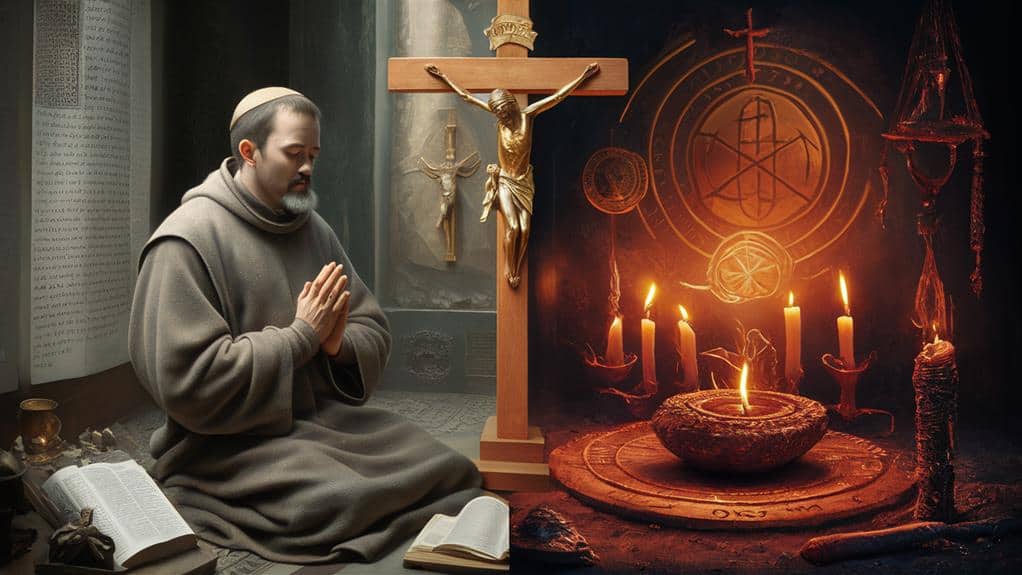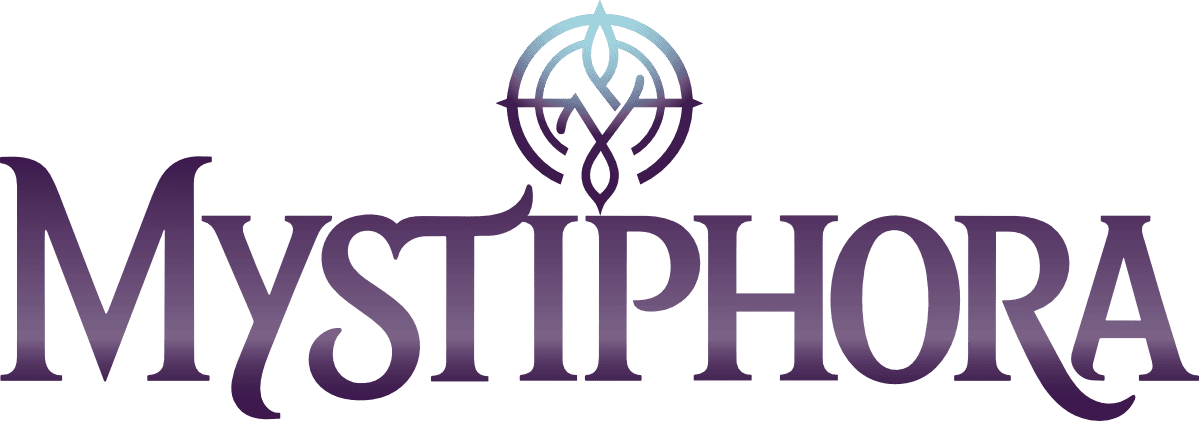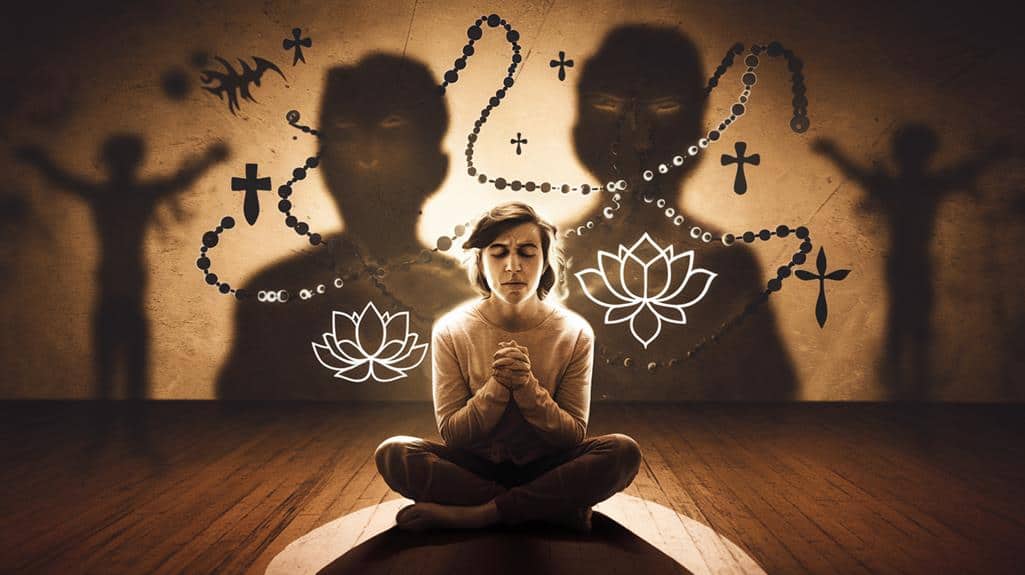Why Mysticism Scares Us
When you venture into the domain of mysticism, you may find yourself confronting a mix of fascination and fear. This is because mystical experiences often defy the rational frameworks you’re accustomed to, plunging you into a subjective world where emotions and intuition play a significant role. The historical abuses and misuses of spiritual practices can further intensify your skepticism, making you wonder if these experiences are genuine or potentially dangerous. As you navigate these uncharted waters, the fear of misinterpretation and the possibility of demonic influences can be overwhelming. Yet, understanding the roots of this fear could be the first step toward embracing a deeper, more authentic spiritual journey.
Subjective Nature of Mystical Experiences

When you explore the sphere of mystical experiences, you quickly encounter their inherently subjective nature. These experiences are deeply personal and often defy the boundaries of language, making them difficult to convey to others. As William James noted, one of the hallmark characteristics of mystical experiences is their ineffability – they can’t be adequately described in words.
You may find yourself in the midst of nature, feeling an overwhelming sense of unity and wholeness, yet struggling to articulate this sensation. The experience might involve a profound, intuitive way of knowing that transcends ordinary sensory perceptions, leading to a heightened awareness and a sense of being truly alive and awake.
The subjective nature of these experiences means they’re heavily influenced by individual perspectives, cultural backgrounds, and personal experiences. For instance, what one person perceives as a mystical encounter with the divine, another might interpret as a beautiful but mundane natural phenomenon.
This subjectivity underscores the unique and intimate connection each person has with their own mystical experiences, making them both deeply personal and universally relatable. In this subjective sphere, you aren’t just a passive observer but an active participant, shaping and interpreting the experience through your own lens.
This intimacy with the mystical invites a profound reflection on the human condition, encouraging you to explore the depths of your own consciousness and the interconnectedness of all things.
Historical Abuses of Spiritual Practices
Historical abuses of spiritual practices have often tarnished the genuine pursuit of mystical experiences, leading to a mix of skepticism and fear. You may have heard stories of how religious and spiritual leaders have misused their authority, causing harm that resonates deeply and lasts for generations.
For instance, the residential school system in Canada, run by churches, was a site of spiritual abuse where Indigenous children were forced to abandon their spiritual practices and adopt Western Christian beliefs. This coercion led to a profound disconnection from their cultural heritage and a lasting impact on their mental and emotional well-being.
In other contexts, spiritual abuse has taken the form of psychological manipulation, where leaders use scripture and spiritual teachings to control and shame individuals. This can result in severe emotional distress, including guilt, shame, and even physical harm.
The misuse of spiritual authority has also been instrumental in perpetuating violence against marginalized groups, such as LGBTQIA+ individuals, who are often subjected to harmful teachings that condemn their identities.
Reflecting on these historical abuses invites you to contemplate the delicate balance between seeking spiritual enlightenment and protecting oneself from exploitation. It underscores the importance of vigilance and critical awareness in spiritual pursuits, ensuring that the quest for deeper understanding doesn’t come at the cost of personal freedom and well-being.
Distinguishing Christian From Pagan Mysticism

As you explore the domain of mysticism, it’s crucial to distinguish between Christian and pagan mysticism, two distinct paths that have evolved with different core beliefs and practices.
Christian mysticism is deeply rooted in the Bible and the teachings of Jesus, emphasizing a personal, relational experience with God. This tradition is characterized by a strong emphasis on communion with God, where the ultimate intimacy is achieved through a union with Christ, as expressed in phrases like “I and the Father are one”.
In contrast, pagan mysticism is often tied to the natural world and the worship of multiple deities. It celebrates the cycle of life, death, and rebirth, and places significant importance on the body and its strengths as a pathway to spiritual practices.
Pagan rituals and festivals frequently honor fertility and the land, reflecting a more holistic and earth-centered spirituality.
The spaces of worship also highlight these differences; Christians gather in consecrated structures like churches and shrines, while pagans often find sacredness in natural settings such as forests, lakes, and hallowed rocks.
This dichotomy in worldview and practice underscores the unique spiritual journeys each path offers, inviting you to reflect on what resonates most deeply within your own quest for meaning and connection.
The Role of Emotions and Bias
The role of emotions and bias in mysticism can greatly influence an individual’s spiritual journey, often in subtle yet profound ways. As you explore the mystical, you may find that your emotions serve as both a guide and a hindrance. Emotions can enhance your spiritual experience by fostering a deeper sense of connection and meaning, but they can also cloud your judgment and lead to biases.
For instance, mysticism and religiosity have been linked to antagonistic attitudes towards certain groups, such as women and Arab immigrants, highlighting how emotional and cognitive biases can infiltrate even the most profound spiritual practices. This dichotomy underscores the complex interplay between emotions, beliefs, and social interactions.
Emotions can make religious beliefs more personal and meaningful, yet they can also lead to an extrinsic orientation, where religion is used to justify prejudice or social dominance rather than genuine spiritual growth.
Reflecting on your own biases and emotional responses is essential. Recognize how your beliefs are shaped by both conscious and unconscious processes, influencing your interactions and attitudes towards others.
Demonic Influences and Misinterpretation

When delving into the domain of mysticism, the potential for misinterpretation and the notion of demonic influences can greatly impact your spiritual journey. As you seek deeper connections with the divine, it’s essential to be aware of the risks involved.
Christian mysticism, when not grounded in scriptural authority, can veer into dangerous territories. Without clear boundaries, you may find yourself exposed to demonic deception, where evil spirits disguise themselves as godly ones, offering counterfeit experiences that feel genuinely spiritual but are ultimately misleading.
The danger lies in substituting doctrine with personal experience, where feelings and subjective interpretations become the arbiter of truth. This can lead to a blurring of lines between genuine spiritual encounters and demonic influences.
As you navigate these waters, it’s imperative to remain discerning, recognizing that true spiritual growth must be rooted in the authority of Scripture and the teachings of Christ. Otherwise, the pursuit of mystical experiences can become a perilous journey, one that may distract you from the authentic path of faith and lead you into the shadows of superstition and fear.
In this delicate balance, it’s important to seek spiritual direction from trusted guides and to approach mystical experiences with a sober and cautious heart, ever mindful of the distinction between the voice of God and the whispers of deception.
Radical Individualism vs. Spiritual Growth
In the pursuit of spiritual growth, you may find yourself at a crossroads between the allure of radical individualism and the authentic path of spiritual development.
Radical individualism, often termed “Sacro-Egoism,” emphasizes personal autonomy and subjective interpretations, allowing individuals to define their own spiritual journeys independent of traditional church or biblical mandates.
This approach can be appealing, as it offers a sense of freedom and self-empowerment, allowing you to explore various spiritual practices and integrate them into your personal life.
However, it also risks isolating you from the communal and corporate aspects of spirituality, which are essential for profound spiritual growth.
The Christian tradition, for instance, stresses the importance of community and mutual support, highlighting that spiritual growth isn’t a solitary endeavor but a journey undertaken with others in the body of Christ.
As you navigate this crossroads, consider whether the pursuit of individual freedom and self-definition might lead to a fragmented and self-centered spirituality.
Authentic spiritual growth often requires a balance between personal exploration and communal engagement, ensuring that your spiritual practices are rooted in a deeper sense of connection and service to others.
This balance can foster a more holistic and meaningful spiritual life, one that’s both personally fulfilling and communally enriching.
Scriptural Accountability and Guidance
As you explore the domain of mysticism, it’s crucial to ground your spiritual journey in scriptural accountability and guidance. This foundation guarantees that your pursuit of the divine is rooted in a clear standard of truth and morality, rather than vague or subjective experiences.
Biblical accountability is about being answerable for your actions, both to God and to others within your community. You are called to live a life of obedience, where your faith is evident through your actions. Jesus taught that true faith involves doing the will of God, and this requires a commitment to accountability.
When you sin, you’re encouraged to confess and repent, not just to God, but also to your fellow believers. This process, outlined in Matthew 18:15-17 and Galatians 6:1-2, fosters spiritual growth and mutual support, helping you stay on the path of righteousness.
Through this accountability, you create a system of checks and balances that promote transparency, vulnerability, and commitment. It’s in this communal context that you can truly grow in your faith and personal relationship with Jesus.
As you walk this path, remember that you’ll give an account of yourself to God, and this realization should inspire a life of integrity and holiness.
Community and Accountability in Mysticism
Community and accountability are essential components of a healthy and grounded spiritual journey, especially in the context of mysticism. As you explore the depths of mystical practices, you begin to realize that you aren’t a separate, isolated individual, but rather an integral part of a larger, interconnected whole. This understanding underscores the importance of community, where you find support, guidance, and the necessary responsibility to navigate the often treacherous paths of spiritual growth.
In mysticism, community isn’t just a social construct but a spiritual necessity. It’s through shared experiences, mutual support, and collective spiritual practices that you can maintain the balance and humility required for a genuine mystical journey. Accountability within this community guarantees that you remain transparent and honest about your struggles and weaknesses, allowing others to help you stay aligned with your spiritual goals.
This interdependence is fundamental to the mystical experience, as it reflects the profound realization that you’re at-One with all other beings. By embracing this communal aspect, you create a safe and nurturing environment where you can confess your sins, seek prayer and healing, and walk together through the processes of conviction and reconciliation.
In this context, accountability isn’t a constraint but a liberating force, guiding you towards a deeper union with the divine and with others. It fosters a culture of mutual respect, trust, and shared commitment to living in accordance with higher principles, guaranteeing that your spiritual growth is both meaningful and sustainable.
Conclusion
As you navigate the intricate landscape of mysticism, remember that fear often stems from the unknown and the subjective. Historical abuses and the risk of demonic influences can cast a shadow of doubt. Yet, it is in embracing the mystery with discernment, grounded in scriptural accountability, that you can distinguish genuine spiritual growth from radical individualism. Allow yourself to be vulnerable, yet wise, and you may find that the depths of mystical experiences reveal a profound intimacy with the divine.









